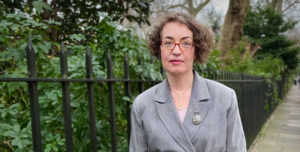Avid readers are a small and dwindling minority of the population. But even they can’t be expected to understand what it means to have one’s book locked away by literary wardens, or manhandled by fat-fingered editors who rifle through typescript like policemen conducting a search — something that’s happening with alarming frequency in the US today.
Plato observes that poets love their poems like fathers love their children. That’s why writers hate to cut their own work — to “murder their babies”, as they must learn to do if they hope to be any good. But they hate it more when others murder their babies, and are even ready to die for the ones they’ve raised and sent out into the world.
D-503 — the protagonist of We, the dystopian sci-fi novel of totalitarianism published in 1921, for which the Soviet author Yevgeny Zamyatin was lucky to be exiled rather than shot — calls the diary he has just begun “a new, still tiny, still blind little human being. It is I and, at the same time, not I.”
And when the KGB confiscated the manuscript of Vasily Grossman’s magnum opus Life and Fate, Grossman wrote to the Soviet leader Nikita Khrushchev, asking: “What is the point of me being physically free when the book I dedicated my life to is arrested?”
A famous passage from the Talmud helps to explain why writers feel this way — and why we should, too: “Adam was created alone to teach you that whoever destroys a single soul, Scripture regards him as if he destroyed the entire world. And whoever saves a single soul, Scripture regards him as if he preserved the entire world.”
Had the first human being died alone, neither Eve nor any of her descendants would have existed. The destruction of a soul is the annihilation of all of its potential offspring, physical and spiritual, until the end of time. But a human soul is an entire world in another way. Perception, thought and feeling open the soul to very many things beyond itself — in principle, to all things — whose impressions it absorbs and assembles into a more or less meaningful whole. Apart from this humanising work, the notion of a universe, a single, all-encompassing whole, might never have occurred to anyone. But this inner world can also be destroyed, corrupted by forgetfulness and publicly erased.
For writers, this Biblical passage rings true: “In the beginning was the Word [logos].” God is said to have fashioned the waters of primordial chaos into a universe by divine speech. One need not be a believer to learn from this story. Human beings are obliged to sort social and psychological chaos by way of logos — reason, speech, order, proportion — in the first instance through law, ritual and the cultural memory of myth. Communities of shared meaning and purpose are woven of language, without which individual experiences would otherwise be poor possessions held in dumb isolation by lonely hominids.
Like the poets and chroniclers of remote antiquity, novelists and dramatists speak to the enduring questions of human life: who we are, where we’ve been and where we’re going. They fabricate buzzing microcosms peopled by characters that live and breathe on contact with other minds and fertile imaginations. Censors don’t just cut out writers’ tongues and stop up readers’ ears, they obliterate worlds.
But the public response to the extensive and aggressive censorship of our time has been depressingly muted. In part, this reflects a widespread loss of what the Germans call Sprachgefühl, a feeling for language and the meaning of words. Most people don’t read books, let alone good ones. They produce and consume short, easily digestible “texts” through electronic media, but hard-won habits of literacy rust in disuse.
Few people know the thrill of repeatedly casting into the depths of a difficult piece of writing, feeling a tug on the line and hauling up a catch of meaning. That experience was more common when deep and challenging books were recited, studied and memorised as sources of wisdom. “Turn it and turn it,” an ancient commentator said of the Bible, “for everything is in it.” Generations of our forebears thought the same of Homer and Dante, Aristotle and Confucius. Who reads like that anymore?
The metallic clang of abstractions now drowns out the living word of particular human minds. Like all bureaucratic and ideological jargon, the governing language of our time is flat, colourless and crude. It is no longer that of poets, prophets and statesmen, but of what Nietzsche called “the coldest of all cold monsters” — the increasingly unified, propaganda-generating, information-gathering-and-monitoring conglomeration of public and private entities that is the post-modern State.
The contemporary sclerosis of language has profound psychological and political consequences. One of Samuel Beckett’s characters wistfully contemplates the dance and hum of bees as they enter and exit their sun-drenched hives, exhibiting a kind of connectedness from which he is excluded by his lonely consciousness. That consciousness of exile is both quintessentially modern and distinctively human. It envies the bees, but cannot find satisfaction in any socially-ordered aggregation of identical units. It yearns for the inner connection between individuals that distinguishes a community from a characterless crowd. But censorship and the decay of language serve only to strengthen the hive-mind and the crowd.
The corruptions of language, politics and society we are now witnessing were foretold in some great dystopian novels of the 20th century. But the English and American authors of those novels had the evidence of history before them, in the form of ideological tyranny: Leninism, Stalinism, Hitlerism and Maoism. And they’d learned from the Bard that what’s past is prologue.
“It’s a beautiful thing, the destruction of words,” one of the characters in George Orwell’s Nineteen Eighty-Four remarks. In the regime of Oceania, which is ruled by a technocratic elite “shaped and brought together by the barren world of monopoly industry and centralised government”, books are everywhere hunted down and destroyed. The State language is crudely binary (like one university’s definition of a lesbian as “a non-man attracted to non-men”), purged of nuance and full of “telescoped words and phrases”, of which its very name, Newspeak, is exemplary. A large department meticulously destroys and reproduces newspapers on a daily basis, rewriting the past to conform with the demands of the present. (Orwell couldn’t have guessed how easy this would be in the digital age.)
The vocabulary of Newspeak is constantly shrinking, because its “whole aim … is to narrow the range of thought”. The State hopes that restricting speech to “short, clipped words which could be uttered rapidly and which roused the minimum of echoes in the speaker’s mind” will ultimately eliminate “thoughtcrime” — or independent thought — if only because “there will be no words in which to express it”.
In Aldous Huxley’s Brave New World, elite technicians govern a stratified society composed of classes of virtually identical human beings grown in scientific hatcheries. While a global State founded on eugenics hasn’t yet materialised, much that Huxley imagines has already come to pass. The society he foresees is debased in familiar ways. It is characterised by a cult of youth; an economy driven by entertainment and the pleasures of virtual reality; the near-universal, habitual use of psychoactive drugs, contraceptives and aphrodisiacs; overt public sexuality; general promiscuity; and a swarming media that makes a great public spectacle of non-conformists.
Love and friendship are hardly possible under these conditions. The citizens of the World State are mere shadows of human beings: smiling surfaces without tragic depth. Little wonder that the one surviving lover of Shakespeare is driven to suicide.
Most people in Brave New World are content with their lot. Thankfully, we are not quite there yet. Ray Bradbury envisions a society more like our own, one full of vague foreboding. Fahrenheit 451 describes a rushing world of violence, suicide and looming war in which a depressed populace distracts itself from the slow death of love and longing with vapid entertainment. Bradbury explicitly connects the fact that “our civilisation is flinging itself to pieces” with the destruction of literature and the deliberate falsification of the past.
Montag, the protagonist, makes a living burning books, in accordance with rules said to have been established in 1790 by the “First Fireman”, Benjamin Franklin. His wife Mildred, who claims to be happy, spends her days in a room with three walls of television screens, surrounded by her “family”: soap-opera uncles, aunts, cousins, nieces and nephews who “said nothing, nothing, nothing and said it loud, loud, loud”. She has no recollection of swallowing a bottle of sleeping pills one night.
An old professor who’s been unemployed since the last liberal arts college shut its doors tells Montag that the magic of books lay in “how they stitched the patches of the universe together into one garment for us”. But they are hated because they “show the pores in the face of life” to a world that wants “only wax moon faces, poreless, hairless, expressionless”.
Chief Beatty, Montag’s deeply conflicted boss, explains how we got here. Everything sped up in the 20th century, when horses, dogs and carts were replaced by faster and faster machines. Time contracted. Books were condensed and pre-digested, “levelled down to a sort of paste pudding norm”. School was shortened, “discipline relaxed, philosophies, histories, languages dropped, English and spelling gradually neglected, finally almost completely ignored”. Sound familiar?
Fahrenheit 451 concludes apocalyptically, with a revelatory global catastrophe. Bradbury draws on some very old stories to make the meaning of this ending fully intelligible. Montag flees a doomed city like Lot escaping the burning of Sodom. The world collapses and must be rebuilt. Insofar as there is hope, it lives in the hearts and minds of scattered old men who remember the writings of Plato, Swift, Jefferson and Lincoln, as well as Matthew, Mark, Luke and John. Montag himself recalls passages from a forbidden volume of Ecclesiastes.
At the novel’s end, Montag remembers a verse from Revelations, The Book of the Apocalypse: “And on either side of the river was there a tree of life, which bare twelve manner of fruits, and yielded her fruits every month; And the leaves of the tree were for the healing of the nations.”
The Jews called the Bible — in Greek, to biblion, or “the book” — an etz chaim, or tree of life. In Revelations, the river of the waters of life sustains two trees of life: the Hebrew Scriptures (whose fruits were the twelve tribes of Israel) and New Testament. The “leaves” of these trees, their pages, were understood to be medicine for the sickness of “the nations”, people who knew nothing of the Bible.
Despite the best efforts of some of our greatest writers, the healing power of books has been mostly forgotten in our time. Must we really wait until our world is thoroughly burned and broken before we begin to mend it?
Disclaimer
Some of the posts we share are controversial and we do not necessarily agree with them in the whole extend. Sometimes we agree with the content or part of it but we do not agree with the narration or language. Nevertheless we find them somehow interesting, valuable and/or informative or we share them, because we strongly believe in freedom of speech, free press and journalism. We strongly encourage you to have a critical approach to all the content, do your own research and analysis to build your own opinion.
We would be glad to have your feedback.
Source: UnHerd Read the original article here: https://unherd.com/




